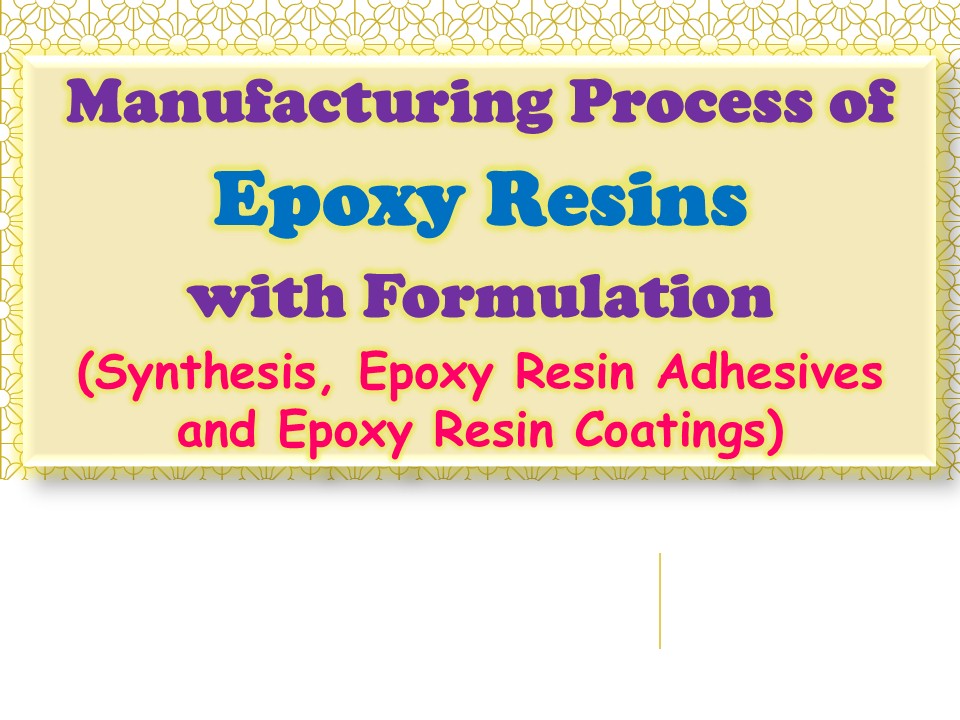
Epoxy resins play a critical role in the global chemical and construction sectors. Known for their exceptional strength, durability, and chemical resistance, these thermosetting polymers are widely used in adhesives, coatings, electronics, and structural applications. The Epoxy Resin Manufacturing Process is a vital industrial activity, offering opportunities for both large-scale producers and small-scale entrepreneurs.
Below is a complete guide that explains the process, types, applications, and market potential of epoxy resins, especially in the context of adhesives and coatings.
Understanding the Epoxy Resin Manufacturing Process
The Epoxy Resin Manufacturing Process starts with the reaction of epichlorohydrin and bisphenol-A, two major organic compounds. This reaction occurs in the presence of a strong base, typically sodium hydroxide, under control temperature and pressure conditions. The result is a glycidyl ether resin that contains reactive epoxy groups.
This resin is then process further by purification and quality testing before being used. While basic chemistry remains constant, variations in molecular weight and curing agents produce different resin grades. Some may offer high flexibility, while others provide thermal stability or electrical insulation.
See Also –Citrus Oil Extraction
In some cases, additives are blend during production to enhance specific properties like UV resistance, water repellency, or flame retardance. These modifications allow manufacturers to tailor epoxy resins for diverse end-user needs.
Raw Materials Required
For the Epoxy Resin Manufacturing Process, the main raw materials are:
-
Epichlorohydrin: An organochlorine compound that serves as a base reactant.
-
Bisphenol-A (BPA): An industrial chemical that determines the resin’s strength.
-
Sodium Hydroxide: A catalyst that initiates the chemical reaction.
-
Curing Agents: Amines, anhydrides, or polyamides used to harden the resin.
-
Solvents and Additives: Added based on the required end-use features.
All ingredients should meet quality standards, as impurities can reduce shelf life or structural integrity.
Types of Epoxy Resins
The types of epoxy resins produced through the Epoxy Resin Manufacturing Process include:
-
Liquid Epoxy Resins: These are most common and are suitable for coatings, adhesives, and flooring.
-
Solid Epoxy Resins: These are used in powder coatings and electrical laminates.
-
Solvent-Cut Epoxy Resins: Used when lower viscosity is needed for application.
-
Waterborne Epoxy Resins: Ideal for eco-friendly applications due to low VOC emissions.
-
Novolac Epoxy Resins: Offer high chemical and thermal resistance.
Each category serves different industries and is produced by tweaking the formulation.
Applications in Adhesives & Coatings
The Epoxy Resin Manufacturing Process has a strong link to the adhesives and coatings sector. These applications account for nearly 60% of global epoxy resin usage.
Adhesives
Epoxy adhesives form high-strength bonds between metals, plastics, ceramics, and composites. They are used in:
-
Aerospace and Automotive industries for structural bonding
-
Consumer Goods like appliances and electronics
-
Construction for anchoring bolts, beams, and tiles
They provide excellent resistance to chemicals and heat, which makes them preferable over traditional glues.
Coatings
Epoxy coatings offer a protective finish that enhances durability. They are widely applied in:
-
Industrial Flooring: Factories and garages benefit from abrasion-resistant epoxy floors.
-
Marine & Automotive Coatings: Offer protection against moisture and corrosion.
-
Pipe Linings and Tanks: Prevent leakage and improve hygiene in storage tanks.
Special formulations ensure that coatings adhere well and cure within desired timeframes.
Equipment Required for Manufacturing
The equipment involved in the Epoxy Resin Manufacturing Process includes:
-
Reactors: For controlled chemical synthesis
-
Mixing Tanks: For blending resins and additives
-
Cooling Systems: Maintain safe operational temperature
-
Filtration Units: Remove impurities before packaging
-
Storage Containers: Maintain quality and prevent contamination
-
Safety Gear: For operator protection against toxic fumes or spills
Automation has been adopted in large units to ensure consistency, but smaller units can use semi-automatic systems as well.
Quality Control & Testing
Quality testing is an essential part of the Epoxy Resin Manufacturing Process. Some key parameters tested include:
-
Viscosity and Reactivity
-
Epoxy Equivalent Weight (EEW)
-
Curing Time
-
Thermal Resistance
-
Mechanical Strength
ISO-certified labs or in-house quality units conduct tests to match client specifications. Poor-quality batches are discarded or reprocessed to maintain brand trust.
Market Potential and Industry Scope
India and Southeast Asia are experiencing growing demand for epoxy products. This rise is driven by urban development, infrastructure growth, electronics manufacturing, and automotive innovation. Therefore, the Epoxy Resin Manufacturing Process opens doors for investment.
According to market surveys, the global epoxy resin market is expected to cross USD 13 billion by 2030. Small-scale units with strategic tie-ups can serve local construction firms and OEMs. Export potential also exists, especially for specialty resins.
Subsidies, startup schemes, and government incentives for Make-in-India further boost the sector’s appeal.
Environmental and Safety Considerations
Care must be taken while handling raw materials like epichlorohydrin and curing agents, as they may release fumes or cause skin irritation. Ventilation, protective gear, and emergency protocols should be implement.
Eco-friendly resins and water-based systems are gaining traction. Investing in greener processes also helps manufacturers comply with international environmental norms. Waste should be treated before disposal, and carbon footprint reduction strategies must be considered.
Business Setup & Licensing Requirements
To start a manufacturing unit, these basic steps are followed:
-
Business Registration: As an LLP, private limited company, or proprietorship.
-
Factory License and MSME Udyam Registration
-
Pollution Control Certificate
-
GST Number and PAN
-
Fire Safety Certificate
-
Import/Export License (if required)
Capital investment varies base on plant capacity. A small-scale unit needs around ?25–?50 lakhs. For large-scale operations, the budget may exceed ?1 crore, especially with advance machinery and testing labs.
Cost Breakdown
The approximate cost structure for a basic Epoxy Resin Manufacturing Process unit may include:
-
Raw Materials: ?10–15 lakhs/month
-
Machinery: ?20–30 lakhs (one-time)
-
Labor and Utilities: ?2–5 lakhs/month
-
Testing and Packaging: ?1–2 lakhs/month
-
Licensing and Miscellaneous: ?3–5 lakhs (initial setup)
ROI depends on plant efficiency, market access, and product quality. With steady demand, breakeven can be achieved in 2–3 years.
See Also – AAC Blocks Manufacturing
Final Thoughts
The Epoxy Resin Manufacturing Process plays a vital role in modern industry. It enables strong, long-lasting adhesives and protective coatings used across multiple sectors. Demand continues to rise due to technological growth and infrastructure expansion.
For entrepreneurs, this sector presents long-term opportunity with manageable investment and high scalability. By ensuring safety, product quality, and compliance, a sustainable and profitable venture can be built in the chemical manufacturing space.
Let your manufacturing journey begin with a smart plan and long-term vision. The future of epoxy is bright, and your enterprise can be part of that growth.





